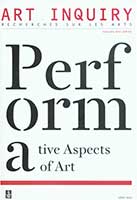The promises of unism, zonism, contextualism, and (dia)critical art. Some aspects of performativity in Polish art (1923-2008)
The promises of unism, zonism, contextualism, and (dia)critical art. Some aspects of performativity in Polish art (1923-2008)
Author(s): Kazimierz PiotrowskiSubject(s): Fine Arts / Performing Arts
Published by: Łódzkie Towarzystwo Naukowe
Keywords: performativity (performatives); speech acts (locutionary; illocutionary; and perlocutionary acts); promise; allegories of reading (unreadability); asteism
Summary/Abstract: The theoretical basis of this study is J.L. Austin’s concept of performativity, which has enjoyed a great career in postmodernism, especially in deconstructionism. The author’s purpose is not to deconstruct Polish classical modernism (Unism, Zonism) for the sake of deconstruction itself, but to show from a historical point of view the extraordinary rise of the idea of performativity in 20th century Polish art, which will illuminate the genesis of the postvanguard stage of artistic development (Contextualism), but also the source of another difference emerging in the postmodern discourse: the so-called Critical Art, or perhaps (Dia) Critical Art. Because – as Paul de Man writes – the performativity of language generates history. The consequence of uttering problematic performatives is that artists become aware of language or of locution: from the uttering of modern performatives or perhaps of the implicit, aporetic performatives (promises) of the avant-garde, when Władysław Strzemiński named some works Unist paintings or sculptures, and Leon Chwistek created the promise of Anti-Unism, to the Contextualist relativisation of the illocutionary power of speech (logos), and to the postmodern deconstruction of Contextualism. Jan Świdziński’s Con-Textualism performed a conscious shift from the descriptive to the performative utterance. (Dia)Critical Art delays the rhetic act in its perlocutionary actions (subversive provocations, scandals, traps, and cunning jokes or asteism). Many artists question the use of language in good faith, comprehending their pseudo-promises as medicine for the violence of the illocutionary power of utterance.
Journal: Art Inquiry
- Issue Year: 2012
- Issue No: 14
- Page Range: 119-146
- Page Count: 28
- Language: English

